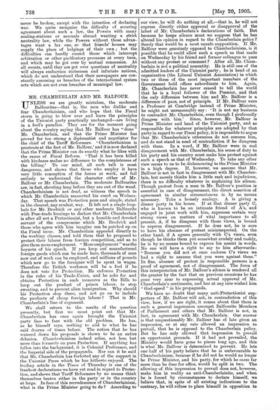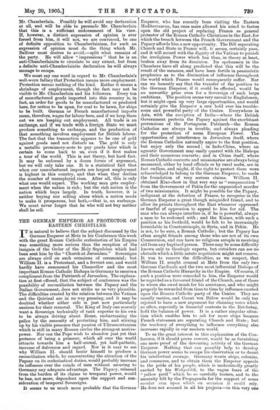storm is going to blow over and leave the principles
of the Unionist party practically unchanged—are living in a fool's paradise. They are for the moment going about the country saying that Mr. Balfour has " done " Mr. Chamberlain, and that the Prime Minister has proved far too strong a diplomatist and negotiator for the chief of the Tariff Reformers. Chamberlainism is prostrate at the feet of Mr. Balfour,' and it is now declared that the Prime Minister can do exactly what he likes with the cause of Fiscal Reform. That it has been killed with kindness makes no difference to the completeness of the killing.' To our mind, all such talk is most dangerous, and shows that those who employ it have very little conception of the forces at work, and fail entirely to understand the character either of Mr. Balfour or Mr. Chamberlain. The moderate Balfourites are, in fact, shouting long before they are out of the wood. Chamberlainism is not dead, as witness the speech in which Mr. Chamberlain reasserted his creed on Wednes- day. That speech was Protection pure and simple, stated in the clearest, nay crudest, way. It left not a single loop- hole for Mr. Brodrick or any other moderate Balfourite with Free-trade leanings to declare that Mr. Chamberlain is after all not a Protectionist, but a humble and devoted servant of the compromise which Mr. Brodrick and those who agree with him imagine can be patched up on the Fiscal issue. Mr. Chamberlain appealed directly to the working classes, and told them that he proposed to protect their labour from foreign competition, and so to give them more employment. " More employment " was the keynote of his speech. If you keep out manufactured foreign goods which can be made here, thousands of men now out of work can be employed, and millions of pounds which now go to the foreigner will be spent in wages. Therefore the British workman will be a fool if he does not vote for Protection. He enforces Protection in the rules of his Trade-Union, and he asks for and obtains Protection in such measures as the Bills to keep out the product of prison labour, to stop sweating, and to prevent alien immigration. Why should his Protection stop there, and not go on to include the products of cheap foreign labour ? That is Mr. Chamberlain's line of argument.
We shall return to the merits of the question presently, but first we must point out that Mr. Chamberlain has once again brought the Unionist party face to face with the old problem. He has, as he himself says, nothing to add to what he has said dozens of times before. The notion that he has watered down his proposals is shown to be an entire delusion. Chamberlainism indeed relies, not less, but more than formerly on pure Protection. If anything has fallen into the background, it is Colonial Preference, and the Imperial side of the propaganda. Nor can it be said that Mr. Chamberlain has forfeited any of the support in the Unionist Press which he has hitherto enjoyed. The leading article in the Times of Thursday is one of the frankest declarations we have yet read in regard to Protec- tion, and shows that Tariff. Reformers by no means think themselves beaten either in the party or in the country at large. In face of this recrudescence of Chamberlainism, what is the Prime Minister going to do ? According to our view, he will do nothing at all,—that is, he will not express directly either approval or disapproval of the latest of Mr. Chamberlain's declarations of faith. But because he keeps silence must we suppose that he has altered his opinion in regard to the Chamberlain policy ?. Surely that would be a most unsafe supposition. If Mr. Balfour were genuinely opposed to Chamberlainism, is it possible that he could allow such a speech as that made on Wednesday by his friend. and former colleague to pass without any protest or comment ? After all, Mr. Cham- berlain is not a political nonentity. He is still one of the admitted leaders of the Unionist party ; he is head of an organisation (the Liberal Unionist Association) in which two or three of the most important members of the Government hold offices subordinate to him. Again, Mr. Chamberlain has never ceased to tell the world. that he is a loyal follower of the Premier, and that the only difference between him and Mr. Balfour is a difference of pace, not of principle. If Mr. Balfour were a Professor at Cambridge instead of Prime Minister, he might not unreasonably say : It is not my business to contradict Mr. Chamberlain, even though I profoundly disagree with him.' Since, however, Mr. Balfour is Prime Minister and head of the Unionist party, and so responsible for whatever principles are adopted by that party in regard to our Fiscal policy, it is impossible to argue that Mr. Chamberlain's utterances do not concern him, and do not stand in need of contradiction if he disagrees with them. In a word, if Mr. Balfour were in real disagreement with Mr. Chamberlain, his sense of duty to his party and his country must make him protest against such a speech as that of Wednesday. To take any other view seems to us to be dishonouring to the Prime Minister in a high degree. If, however, we assume that Mr. Balfour is not in fact in disagreement with Mr. Chamber- lain, but merely thinks him a little rash and injudicious, there is no difficulty whatever in explaining his silence. Though protest from a man in Mr. Balfour's position is essential in case of disagreement, the direct assertion of aareement in similar circumstances is by no means 0 necessary. Take a homely analogy. A is giving a dinner party in his house. If at that dinner party C, who is known to be an intimate friend of A's, and engaged in joint work with him, expresses certain very strong views on matters of vital importance to all present, A, if he disagrees with those views, is bound to express disagreement. If he does not, he is sure to have his absence of protest misinterpreted. On the other hand, if A agrees generally with C's views, even though he thinks them put somewhat crudely and rashly, he is by no means bound to express his assent in words. No one will have a right to say to him afterwards : " Because you did not at once endorse C's views we had a right to assume that you were against them." In fine, absence of protest in responsible persons is a, proof of agreement, not of disagreement. The force of this interpretation of Mr. Balfour's silence is rendered all the greater by the fact that on previous occasions he has gone very near to expressing actual approval of Mr. Chamberlain's sentiments, and has at any rate wished him " God-speed " in his propaganda.
We have no doubt that many anti-Protectionist sup- porters of Mr. Balfour will ask, in contradiction of this view, how, if we are right, it comes about that there is' such a general impression amongst Balfourite Members of Parliament and others that Mr. Balfour is not, in fact, in agreement with Mr. Chamberlain. Our answer is that unquestionably Mr. Balfour has of late given an impression, or at any rate allowed an impression to prevail, that he is opposed to the Chamberlain policy. But he has only allowed that impression to prevail on opportunist grounds. If it had not prevailed, the Ministry would hair() gone to pieces long ago, and this is what Mr. Balfour is determined to prevent. He lets one half of his party believe that he is unfavourable to Chamberlainism, because if he did not he would no longer be Prime Minister, and his party, for which he cares far more than he does for office, would be split in two. The allowing of this impression to prevail does not, however, make him in reality an anti-Chamberlainite, and when he is forced by circumstances to declare himself, we believe that, in spite of all existing indications to the contrary, he will refuse to place himself in opposition to Mr. Chamberlain. Possibly he will avoid any declaration at all, and will be able to persuade Mr. Chamberlain that this is a sufficient endorsement of his view. If, however, a distinct expression of opinion is ever forced from him, it will not, we are convinced, be one of definite opposition to Chamberlainism, for such an expression of opinion must do the thing which Mr. Balfour most desires to avoid,—split what remains of the party. He will allow " impressions " that he is an anti-Chamberlainite to circulate to any extent, but from a definite anti-Chamberlainite declaration he will always manage to escape.
We must say one word in regard to Mr. Chamberlain's well-worn fallacy that Protection means more employment. Protection means nothing of the kind. Rather it means a. shrinkage of employment, though the fact may not be visible to Mr. Chamberlain and his followers. Every ton of manufactured goods imported into this country is, in fact, an order for goods to be manufactured or produced here, for cotton to be spun, for coal to be hewn, for ships to be built. German or French manufactured imports mean, therefore, wages for labour here, and if we keep them out we are keeping out employment. All trade is an exchange, and if we trade with a foreign State we must produce something to exchange, and the production of that something involves employment for British labour. The fact that the transaction appears to be one of gold against goods need not disturb us. The gold is only a metallic promissory-note to pay goods later which is certain to come back to us, even if it first makes a tour of the world. This is not theory, but hard fact. It may be enforced by a dozen forms of argument, but we will only take one. It is a statistical fact that when our manufactured imports are largest employment is highest in this country, and that when they decline the number of unemployed rises. After all, this is only what one would expect. The working man gets employ- ment when the nation is rich ; but the rich nation is the nation which buys largely. In truth, however, it is neither buying nor selling alone which a nation needs to make it prosperous, but both,—that is, an exchange. We must never forget that he who will not buy neither shall he sell.
9.11E GERMAN EMPEROR AS PROTECTOR OF EASTERN CHRISTIANS.







































 Previous page
Previous page